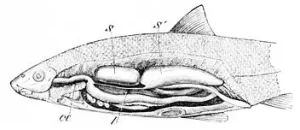Although I don’t currently own a betta fish, I’ve shared my life with many over the years. My last pair were two beautiful black dragons that were stunning but unfortunately suffered from quite a few health issues. The female betta had recurring bouts of swim bladder disease. The swim bladder is a gas-filled organ unique to some species of fish. It’s basically like an internal sack, sort of like a balloon, that helps fish control their buoyancy in the water. Although issues with the swim bladder can be relatively common in bettas, thankfully swim bladder disease doesn’t have to be a death sentence.

Swim Bladder Disease, sometimes referred to as Swim Bladder Disorder or SBD occurs when the function of the swim bladder somehow becomes disrupted. This is most commonly caused by bacterial infections, physical damage to the swim bladder, genetic defects, enlarged organs, parasites, constipation, and/or overfeeding.

Symptoms of Swim Bladder Disease in Betta Fish
No matter the cause, when the swim bladder is compromised it impairs a fish’s ability to swim normally. The inability to maintain his/her position in the water column is the most recognized symptom of SBD. Fish may either sink to the bottom of the aquarium or spend most of their time floating at the top. SBD will sometimes cause living fish to float upside down at the top of the water, a distressing sight for any aquarium keeper. Other symptoms of SBD can include lethargy, lack of appetite, swimming abnormally esp. with the tail positioned higher than the head, and/or a swollen, bloated-looking stomach.
Swim Bladder Disease Treatment
Treatment of SBD depends on the underlying cause. The trick, in many cases, is determining the cause. Some causes, such as overfeeding, are easy to correct. Others, such as issues with neighboring organs, are not only more difficult to diagnose, but also to treat.
Luckily, in bettas, the most common cause of SBD is overfeeding and/or constipation. A large amount of food in the stomach and intestines can press against the swim bladder, leaving less room in your fish’s body for their swim bladder to function properly.
Usually the first course of action when a betta fish develops swim bladder issues is to fast your fish. After 3 or 4 days of fasting, the fish should be fed smaller, more appropriate amounts of food. In the case of constipation, after a period of fasting you can offer your fish pieces of skinned, cooked peas. The peas contain high levels of fiber that may help act as a laxative for constipated fish.
What About Swim Bladder Disease That’s Not Caused by Overfeeding or Constipation?
If your fish is not constipated and you are feeding an appropriate diet (in the appropriate amounts), or your fish has other symptoms that point to an illness such as a bacterial infection or parasites, additional treatment may be necessary. Broad spectrum antibiotics and anti-parasitics for fish can often be purchased over the counter at your local fish store. Always make sure to do your research before starting a new treatment (or combination of treatments) and follow the instructions that come with medications carefully. If you can, consider consulting with a veterinarian experienced with treating fish before starting any new medications.
In the case of an injury to the swim bladder, really all you can do is keep your fish comfortable and give the swim bladder time to heal itself. No matter the cause of SBD, fish should be maintained in proper set ups. Keep an eye on your fish’s water parameters and temperatures. If your betta is really struggling to swim and cannot easily reach the top of the aquarium to gulp air, lowering the water level should help.
Swim Bladder Disease is Not a Death Sentence
Although it often doesn’t look pleasant, SBD by itself is not normally fatal. The overall outcome of SBD depends on the underlying cause of the disease. The most common causes in bettas, overfeeding and constipation, luckily have a high survival rate as long as conditions are improved.
How to Avoid Swim Bladder Disease

To avoid swim bladder disease, take care not to overfeed your betta. Your betta’s stomach is smaller than its eye! It can be easy to overfeed, especially when we want to treat our fishy friends, but keeping them healthy is important. Some foods, such as flaked and freeze dried foods, tend to expand once exposed to water. Soaking such foods before offering them to your fish can help ensure that they don’t expand inside your fish’s stomach. Make sure you are maintaining your fish in the proper environment. Poor water quality can compromise your fish’s health and improper water temperatures can lower the immune system as well as effect metabolism.
In the case of my betta, I suspect that her swim bladder disease was caused by overeating. I kept her in a community tank, and have a feeling that my little betta was getting more than her fair share of the food. Eventually, I ended up moving her into her own aquarium. After that she never had another issue with her swim bladder.
I learned, the hard way, why it’s so important not to overfeed my fish! Luckily, once I figured out what was causing her swim bladder disease, I was able to correct my care so my little betta never had to suffer from it again. I made sure to only feed her small amounts, and since her have been more cautious to avoid overfeeding my fish.
Have you ever had to deal with swim bladder issues in your fish?
